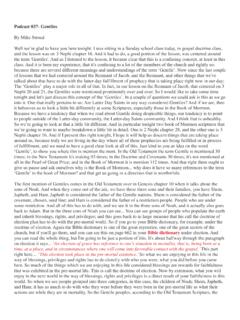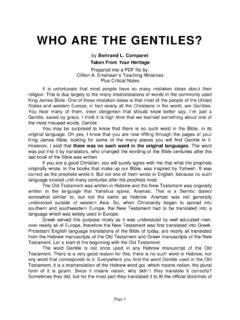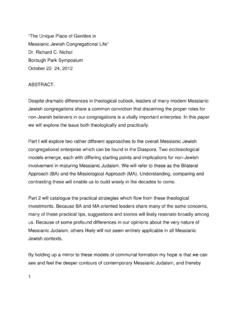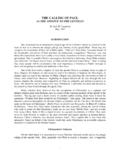Transcription of Thoughts on Reason and Faith - Thomas Aquinas College
1 Thoughts on Reason and FaithSumma Contra gentiles , Chapters 1 8by St. Thomas AquinasSeminar hosted by Thomas Aquinas CollegeNapa Institute Conference 2014 Catholics in the Next America Napa, CaliforniaThursday, July 24, 2014 Breakfast: 8:30 9:00 : 9:00 10:30 Aquinas College California - 1971 Chapter 1 The Office of the Wise Man My mouth shall meditate truth, and my lips shall hate impiety (Prov. 8:7). [1] The usage of the multitude, which according to the Philosopher is to be followed in giving names to things, has commonly held that they are to be called wise who order things rightly and govern them well. Hence, among other things that men have conceived about the wise man, the Philosopher includes the notion that it belongs to the wise man to order. Now, the rule of government and order for all things directed to an end must be taken from the end.
2 For, since the end of each thing is its good, a thing is then best disposed when it is fittingly ordered to its end. And so we see among the arts that one functions as the governor and the ruler of another because it controls its end. Thus, the art of medicine rules and orders the art of the chemist because health, with which medicine is concerned, is the end of all the medications prepared by the art of the chemist. A similar situation obtains in the art of ship navigation in relation to shipbuilding, and in the military art with respect to the equestrian art and the equipment of war. The arts that rule other arts are called architectonic, as being the ruling arts. That is why the artisans devoted to these arts, who are called master artisans, appropriate to themselves the name of wise men.
3 But, since these artisans are concerned, in each case, with the ends of certain particular things, they do not reach to the universal end of all things. They are therefore said to be wise with respect to this or that thing; in which sense it is said that as a wise architect, I have laid the foundation (1 Cor. 3:10). The name of the absolutely wise man, however, is reserved for him whose consideration is directed to the end of the universe, which is also the origin of the universe. That is why, according to the Philosopher, it belongs to the wise man to consider the highest causes. [2] Now, the end of each thing is that which is intended by its first author or mover. But the first author and mover of the universe is an intellect, as will be later shown. The ultimate end of the universe must, therefore, be the good of an intellect.
4 This good is truth. Truth must consequently be the ultimate end of the whole universe, and the con-sideration of the wise man aims principally at truth. So it is that, according to His own statement, divine Wisdom testifies that He has assumed flesh and come into the world in order to make the truth known: For this was I born, and for this came I into the world, that I should give testimony to the truth ( John 18:37). The Philosopher himself establishes that first philosophy is the science of truth, not of any truth, but of that truth which is the origin of all truth, namely, which belongs to the first principle whereby all things are. The truth belonging to such a principle is, clearly, the source of all truth; for things have the same disposition in truth as in being. [3] It belongs to one and the same science, however, both to pursue one of two contraries and to oppose the other.
5 Medicine, for example, seeks to effect health and to eliminate illness. Hence, just as it belongs to the wise man to meditate especially on the truth belonging to the first principle and to teach it to others, so it belongs to him to refute the opposing falsehood. [4] Appropriately, therefore, is the twofold office of the wise man shown from the mouth of Wisdom in our opening words: to meditate and speak forth of the divine truth, which is truth in person (Wisdom touches on this in the words my mouth shall meditate truth), and to refute the opposing error (which Wisdom touches on in the words and my lips shall hate impiety). By impiety is here meant falsehood against the divine truth. This falsehood is contrary to religion, which is likewise named piety. Hence, the falsehood contrary to it is called impiety.
6 1 Chapter 2 The Author s Intention in the Present Work [1] Among all human pursuits, the pursuit of wisdom is more perfect, more noble, more useful, and more full of j o y. It is more perfect because, in so far as a man gives himself to the pursuit of wisdom, so far does he even now have some share in true beatitude. And so a wise man has said: Blessed is the man that shall continue in wisdom (Sir-ach 14:22). It is more noble because through this pursuit man especially approaches to a likeness to God Who made all things in wisdom (Ps. 103:24). And since likeness is the cause of love, the pursuit of wisdom especially joins man to God in friendship. That is why it is said of wisdom that she is an infinite treasure to men! which they that use become the friends of God (Wis. 7:14).
7 It is more useful because through wisdom we arrive at the kingdom of immortality. For the desire of wisdom leads to the everlasting kingdom (Wis. 6:21). It is more full of joy because her conversation has no bitterness, nor her company any tediousness, but joy and gladness (Wis. 7:16). [2] And so, in the name of the divine Mercy, I have the confidence to embark upon the work of a wise man, even though this may surpass my powers, and I have set myself the task of making known, as far as my limited powers will allow, the truth that the Catholic Faith professes, and of setting aside the errors that are opposed to it. To use the words of Hilary: I am aware that I owe this to God as the chief duty of my life, that my every word and sense may speak of Him [De Trinitate I, 37]. [3] To proceed against individual errors, however, is a difficult business, and this for two reasons .
8 In the first place, it is difficult because the sacrilegious remarks of individual men who have erred are not so well known to us so that we may use what they say as the basis of proceeding to a refutation of their errors. This is, indeed, the method that the ancient Doctors of the Church used in the refutation of the errors of the gentiles . For they could know the positions taken by the gentiles since they themselves had been gentiles , or at least had lived among the gentiles and had been instructed in their teaching. In the second place, it is difficult because some of them, such as the Mohammedans and the pagans, do not agree with us in accepting the authority of any Scripture, by which they may be convinced of their error. Thus, against the Jews we are able to argue by means of the Old Testament, while against heretics we are able to argue by means of the New Testament.
9 But the Muslims and the pagans accept neither the one nor the other. We must, therefore, have recourse to the natural Reason , to which all men are forced to give their assent. However, it is true, in divine matters the natural Reason has its failings. [4] Now, while we are investigating some given truth, we shall also show what errors are set aside by it; and we shall likewise show how the truth that we come to know by demonstration is in accord with the Christian religion. 2 Chapter 3 On the Way in Which Divine Truth Is To Be Made Known [1] The way of making truth known is not always the same, and, as the Philosopher has very well said, it belongs to an educated man to seek such certitude in each thing as the nature of that thing allows. The remark is also intro-duced by Boethius [De Trinitate II].
10 But, since such is the case, we must first show what way is open to us in order that we may make known the truth which is our object. [2] There is a twofold mode of truth in what we profess about God. Some truths about God exceed all the ability of the human Reason . Such is the truth that God is triune. But there are some truths which the natural Reason also is able to reach. Such are that God exists, that He is one, and the like. In fact, such truths about God have been proved demonstratively by the philosophers, guided by the light of the natural Reason . [3] That there are certain truths about God that totally surpass man s ability appears with the greatest evidence. Since, indeed, the principle of all knowledge that the Reason perceives about some thing is the understanding of the very substance of that being (for according to Aristotle what a thing is is the principle of demonstration) [Poste-rior Analytics II, 3], it is necessary that the way in which we understand the substance of a thing determines the way in which we know what belongs to it.









